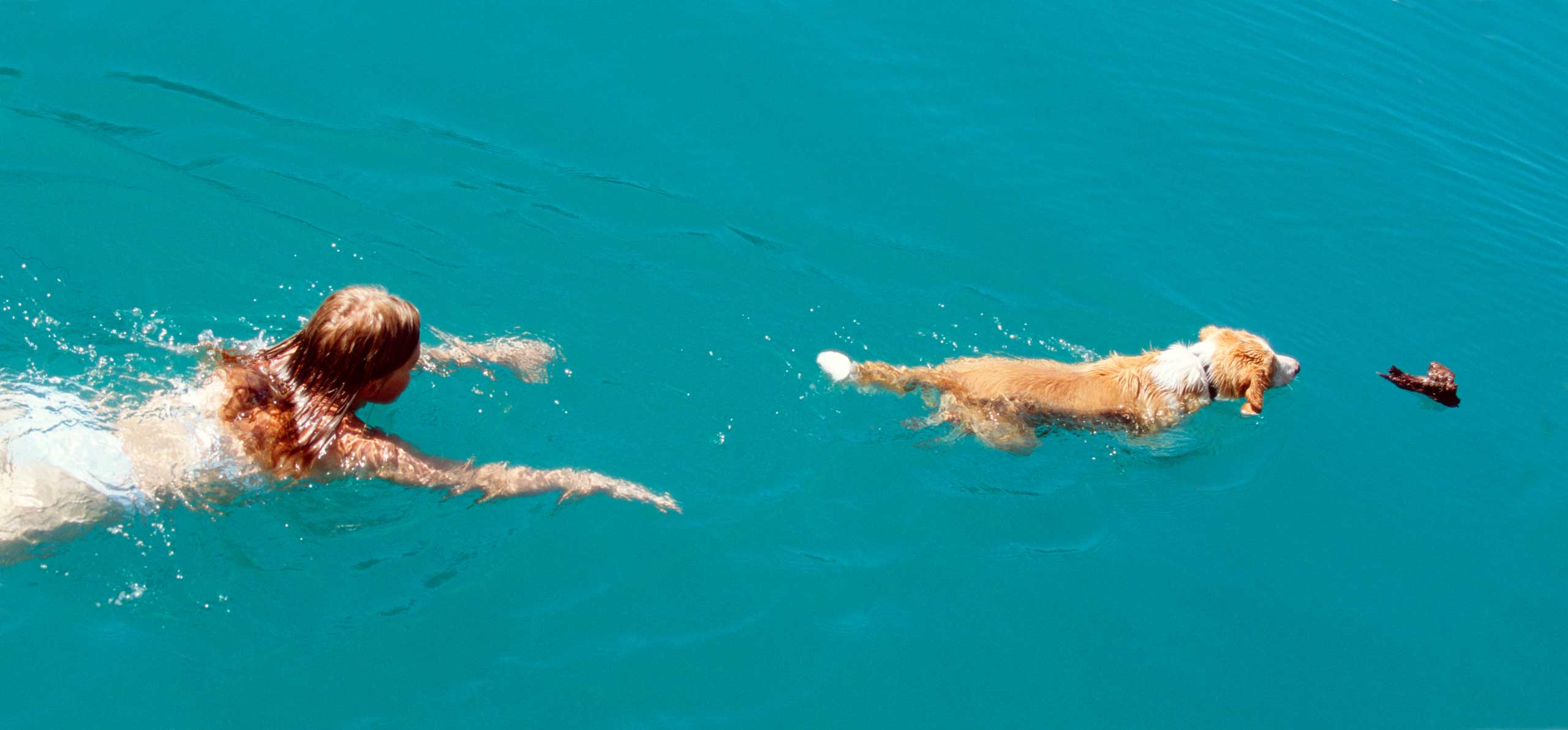Can All Dogs Swim?
Some dogs are bred to dive right in. If the name of your breed contains the word “water,” like the Portuguese Water Dog or the Irish Water Spaniel, it’s a pretty good bet your furry friend will happily paddle without instruction. Other breeds that usually make good swimmers include retrievers, Newfoundlands, and standard poodles, whose distinctive clips were originally intended to keep the dog’s major joints warm in cold water.
Short, heavy-bodied dogs like Scottish and Boston Terriers, Corgis, Bulldogs, Basset Hounds, and Pugs generally sink instead of swim. No amount of instruction will turn a dog who is physically incapable of staying afloat into an Olympic swimmer.
But as any Pet Parent knows, dogs are individuals with distinct personalities and preferences. Some Golden Retrievers may be afraid of the water while a toy-sized dog may swim like a fish. And not all dogs are instinctive swimmers. Before yours takes the plunge, give him a lesson or two and observe some simple safety precautions.
Water Safety for Dogs
Consider these key safety tips: Never let your dog swim unattended. Even a good swimmer can make mistakes and miss how to get out of the pool or might swim too far out into the ocean.
Use a dog life jacket or a life vest.
What’s the difference? A dog life jacket covers more of your dog’s body, helps them float, and helps you see them more easily in the water. A dog life vest is lighter, covers less of their body, and is made for pools (not larger bodies of water). Whichever one you go with, make sure it’s made of waterproof material and is adjustable so it can fit your dog snuggly.
Even if they’re wearing a life jacket or vest, always avoid dangerous waters. Stay away from rough or fast-flowing water to prevent accidents.
Watch for Swallowing Water
Dogs commonly swallow water while they’re swimming, but if they swim for a long time and get fatigued, they can start to take in too much water. A common way to know if they swallowed too much water is if they throw up after swimming. This is called water toxicity and can cause your dog to get sick. The best way to prevent water toxicity is to keep swimming sessions short, at a max of 10 minutes.
Also make sure to check the water temperature before bringing your dog in. Ensure it’s not too cold to prevent hypothermia in dogs.
How to Teach Your Dog to Swim
To get started, take your dog to the edge of the lake or the shallow end of the pool so he can experience getting his paws wet. Encourage him with praise and treats. If your dog learns there’s a reward for being in the water, they may want to stay in or will want to swim again in the future.
Never throw your dog in the water with a “sink or swim” mentality. You could cause unnecessary anxiety and make them not want to try swimming ever again.
Use Toys & Treats to Tempt Your Dog into the Water
Understanding what motivates your dog can help a lot. If he likes a certain toy, bring it in and toss it short distances to get him comfortable in the water. If he responds to treats, give him a bit of something special when he gets into the water, then reinforce the behavior with another treat when he swims a short distance.
Like we mentioned before, dogs that are not commonly known to be good swimmers or even enjoy it could easily pick it up, or vice versa, a dog that should be made for the water might not want to go near it. But for the most part, some breeds are prone to swimming, and there are other breeds that might struggle in the water. No matter what kind of dog you have, keep these tips in mind if you venture to the pool or an open body of water so they can learn how to doggy paddle safely and slowly.
Which Dog Breeds Are Natural Swimmers?
- Akita American Water Spaniel
- Barbets
- Boykin Spaniel
- Chesapeake Bay
- Retriever
- English Setter
- Golden Retriever
- Hungarian Pula
- Irish Water Spaniel
- Kerry Blue Terrier
- Labrador Retriever
- Newfoundland
- Nova Scotia Duck Tolling Retriever
- Otterhound
- Portuguese Water Dog
- Spanish Water Dog
- Standard Poodle
Not-so-natural swimmers (dogs with heavy bodies or short legs):
- Basset Hound
- Boston Terrier
- Bulldog
- Pug
- Scottish Terrier
- Welsh Corgi

